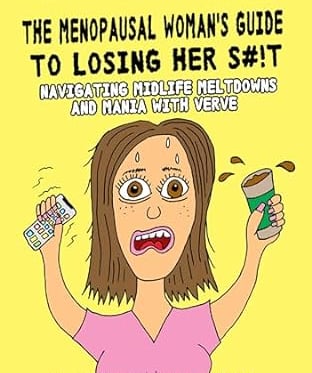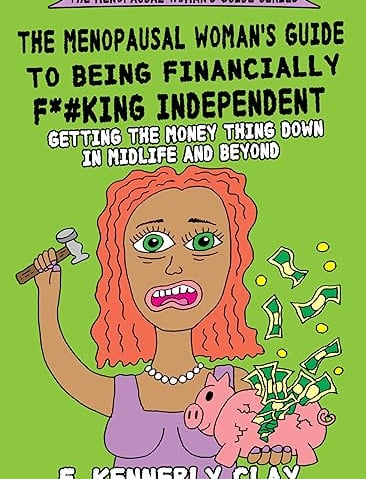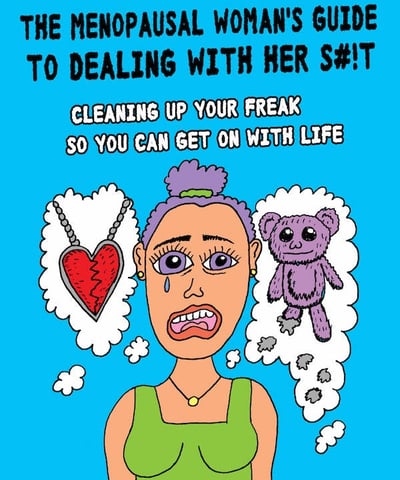Why You Want to Be Alone in Menopause
Menopause can make you want to be alone because the symptoms can be so overwhelming they make us go inward. Here's how to embrace the solitude.
MENOPAUSAL SYMPTOMSMENOPAUSAL DEPRESSION
Kennerly Clay
7/23/20245 min read


Does menopause make you want to be alone?
If you're feeling like you just want to crawl away and hide during menopause, you're right on track. You may be dealing with feelings of overwhelm, unbearable fatigue that haunts your days, weight gain that embarrasses you (or pisses you off), or just feeling so not like "yourself" you don't want to be around other people while you're coping with menopause depression. Such is our mental health in menopause.
I get it. I've been here. During much of the perimenopausal years, I didn't feel like hanging out with friends, and certainly not with my own family. I wanted to pull the covers over my head and wait for 10 years to pass. But I wouldn't recommend hiding out as a regular thing. Here's why.
If you or someone you know is in crisis, please call 988, the Suicide & Crisis Lifeline in the United States.
Menopause: A primer
Menopause is a natural biological process that signifies the end of a woman's reproductive years. It's typically divided into three stages:
Perimenopause - The transitional phase leading up to menopause, can start several years before the final menstrual period. During this stage, your body gradually produces less estrogen and progesterone, resulting in irregular menstrual cycles and a variety of physical symptoms such as hot flashes, night sweats, and sleep disturbances.
Menopause - Officially diagnosed when you've gone 12 consecutive months without a menstrual period. This stage marks the end of menstrual cycles and the beginning of postmenopause.
Postmenopause - One year and beyond the first year without your period. While the physical symptoms may persist for some time, they often decrease in intensity and frequency during postmenopause.
Alongside these physical changes, menopause can have significant emotional and psychological impacts. Hormonal fluctuations during perimenopause and menopause can lead to mood swings, irritability, and heightened anxiety. These hormonal shifts can also contribute to feelings of sadness and depression. Menopausal women may also experience increased stress and a sense of loss or mourning for their previous reproductive capabilities.
Wanting to be alone in menopause
A common experience during menopause is a pronounced desire for solitude. This phenomenon can be attributed to various factors, primarily hormonal changes, which play a crucial role in influencing mood and emotional health during menopause.
Hormonal fluctuations, especially in estrogen and progesterone levels, are known to affect neurotransmitters in the brain. Estrogen, for example, has a direct impact on serotonin, a neurotransmitter that regulates mood. When estrogen levels drop, serotonin production can decrease, leading to feelings of sadness, irritability, and even isolation. This connection between hormonal changes and mood is well-documented. A recent study by scientists at Weill Cornell Medicine used positron emission tomography (PET) imaging to examine estrogen activity in the brain. Their study revealed that throughout the menopausal transition, estrogen receptors in multiple brain regions notably increased. This rise correlated with poorer cognitive function and an uptick in mood-related symptoms.
Studies have also shown that the decline in progesterone can contribute to increased anxiety and a sense of unease. These emotional shifts can make social interactions more challenging, causing many women to seek solitude as a coping mechanism. It makes sense, right? A shitshow going on hormonally along with the fact you give way fewer fucks than ever, it's no wonder you want to be alone in menopause!
During much of the perimenopausal years, I didn't feel like hanging out with friends and certainly not with my own family. I wanted to pull the covers over my head and wait for 10 years to pass. But I wouldn't recommend hiding out as a regular thing.
The pros and cons of being alone in menopause
On the one hand, going inward and wanting to be by your self can be nurturing and satisfying. By quieting your life and your mind, you can seek out new hobbies or participate in things that bring you joy, just by being by yourself.
I love to dance around to my favorite playlist to get my happy hormones going. I also enjoy the quiet solitude of ikebana, Japanese flower arranging. Other solo pursuits include reading books and even traveling by myself. When I'm alone, I don't have to subject others to my moods, which are sometimes quite pissy. Plus, I don't have to respond to the needs or whims of others. If you've never been alone much in your life, the menopausal years are a great time to get to know yourself more deeply and discover the joy of solitude.
But being alone can also lead to isolation, which is a marked symptom of depression. There's certainly a fine line. It's important to be aware of symptoms of isolation so you can recognize whether you're enjoying your quiet solitude or you're heading for depression. Pay attention to these emotional and behavioral cues:
Emotional signs
Persistent sadness: Feeling consistently down, hopeless, or empty.
Emptiness or numbness: A lack of emotional responsiveness or feeling disconnected.
Loss of interest: Not finding pleasure in activities that were once enjoyable.
Feeling worthless or guilty: Having a sense of self-blame or low self-esteem.
Hopelessness: Feeling like things will never get better.
Behavioral signs
Withdrawal: Avoiding social interactions or reducing communication with others.
Loss of energy: Feeling fatigued or lacking motivation to engage in usual activities.
Changes in sleep patterns: Sleeping too much or too little.
Changes in appetite: Eating significantly more or less than usual.
Neglecting responsibilities: Difficulty keeping up with work, school, or daily tasks.
Physical symptoms
Aches and pains: Unexplained physical symptoms such as headaches or digestive problems.
Slowed movement: Speaking or moving more slowly than usual.
Restlessness: Feeling agitated or restless.
Cognitive signs
Difficulty concentrating: Trouble focusing, making decisions, or remembering things.
Negative thoughts: Persistent negative thinking patterns or thoughts of self-harm.
Social signs
Avoidance: Avoiding social situations or withdrawing from friends and family.
Feelings of rejection: Feeling like others don’t understand or care about you.
Recognizing these signs in yourself or others can be a crucial first step in seeking support and intervention for depression and feelings of isolation. If you or someone you know is experiencing these symptoms, reach out to a mental health professional or trusted individual for support. Support groups for menopause, whether in-person or online, offer a platform to share experiences and receive advice.
So just know that if you want to be alone in menopause, go for it. Feed your soul. But if you don't want to be alone, you're definitely not.
Wanna talk more about wanting to be alone in menopause?
Books for women who are losing it in menopause
Mental Health
Losing your mind in peri/menopause?
The menopausal woman's guide series
Financial Health
Had enough of financial insanity?
Personal Growth
Triggers? Old stuff kicking up?
Related topics
Explore helpful articles, tips, and advice for women who are losing their shit in menopause.
Community
Stay Connected
© 2024. Eclectic Content, Inc. All rights reserved.






